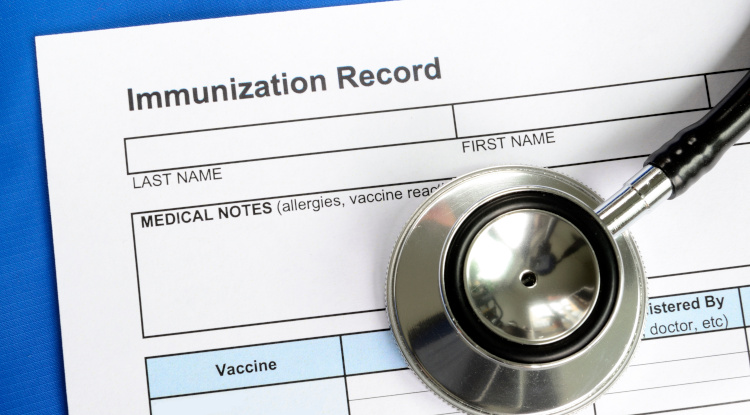Vaccinating Your Family
Your family’s best shot at staying healthy!
Vaccines your child needs
Vaccines can prevent infectious diseases that once killed or harmed many infants, children, and adults. Without vaccines, your child is at risk for getting seriously ill and suffering pain, disability, and even death from diseases like measles and whooping cough.
Vaccines aid your immune system fight infections rapidly and more successfully. Vaccines alert your immune response which help the body fight off disease-carrying organisms. If the virus invades your body again, your immune system will remember it and will attack it to prevent you from getting sick.
Learn more about immunity and reasons to vaccinate from the CDC.
Recommended Vaccines from Birth Through 6 Years Old:
RSV antibody, Hepatitis B, Rotavirus, DTaP, Hib, Pneumococcal, Polio, COVID-19, Influenza/Flu, MMR, Varicella, Hepatitis A
- Learn more about diseases these vaccines protect against from the CDC.
Recommended Vaccines for Older Children and Teens:
HPV, Tdap, Meningococcal ACWY, Meningococcal B, Influenza/Flu, COVID-19
- Learn more about diseases these vaccines protect against from the CDC.
Where to get vaccinated in Chicago

Visit a CDPH Immunization Clinic :
- Greater Lawn West 55th Street Health Hub
- Pilsen South Ashland Health Hub
- Roseland East 115th Street Health Hub
- Uptown West Wilson Avenue Health Hub
Make an appointment at getvaxchi.chicago.gov.
Visit a Chicago Public Schools on-site health center:
- Learn more at schoolinfo.cps.edu/HealthCenters.
Connect with a federally qualified health center:
- Learn more at findahealthcenter.hrsa.gov.
Getting ready for a vaccine appointment

Nervous about getting your child vaccinated? Let talk about what you need to be prepared:
- Be honest with them. This might hurt but only for second.
- Wear clothes that are easy to get in and out of.
- Bring comfort items.
- Does your child have a favorite stuff animal or a toy that they love that can help be a distraction? Bring them with!
Here are some resources you might want to check out!
What to expect after getting vaccinated
- Mild side effects are expected or none at all.
- Mild reactions usually disappear on their own within a few days.
- Serious long-lasting reactions are rare.
Learn more from Immunize.org (español).
How to find your child’s vaccine records

- First, contact your child’s pediatrician.
- Your child’s school may keep vaccination records. Contact your child’s school for more information.
- If your child was vaccinated in Illinois, access your child’s immunization records with Vax Verify. Learn more about Vax Verify at idphportal.illinois.gov
 TIP FOR PARENTS
TIP FOR PARENTS
-
It is important for your child to follow the recommended vaccines schedule to acquire maximum effectiveness against vaccine-preventable diseases.
-
Providers can use combination vaccines reduces the number of injections per visit.
-
Call the doctor’s office before bringing your child if they are ill so the healthcare professionals can take appropriate precautions to protect your child and others, especially those who are not yet fully vaccinated and those who have weakened immune systems.
Vaccines FAQ
Click the topics below to learn more about vaccines.
Yes. Vaccines are very safe. The United States’ long-standing vaccine safety system ensures that vaccines are as safe as possible. Currently, the United States has the safest vaccine supply in its history. Millions of children safely receive vaccines each year. The most common side effects are very mild, such as pain or swelling at the injection site.
The main risks associated with getting vaccines are side effects, which are almost always mild (redness and swelling at the injection site) and go away within a few days. Serious side effects after vaccination, such as a severe allergic reaction, are very rare and doctors and clinic staff are trained to deal with them. The disease-prevention benefits of getting vaccines are much greater than the possible side effects for almost all children. The only exceptions to this are cases in which a child has a serious chronic medical condition like cancer or a disease that weakens the immune system or has had a severe allergic reaction to a previous vaccine dose.
In Illinois, children enrolling or entering childcare facilities or schools are required to be vaccinated. Learn more from the Illinois Department of Public Health.
Prior to international travel or travel to part of the U.S. with a measles outbreak, all adults and children over 1 year of age should receive 2 doses of the MMR vaccine separated by at least 28 days. Infants 6-11 months of age should receive an early MMR dose prior to traveling internationally; for infants 6-11 months traveling to a part of the U.S. with a measles outbreak, this early dose should be considered as well. Of note, infants who receive an early MMR dose will still need 2 additional doses of MMR after 1 year of age. Talk with your health care provider about protecting yourself and your child as soon as you know your travel plans. Infants who are too young to be vaccinated should avoid contact with sick people or situations where they may be exposed to sick people.
Visit https://www.cdc.gov/measles/plan-for-travel.html or download the MMR travel recommendations documents for more information:
- MMR Vaccine Before Travel (English)
- MMR Vaccine Before Travel (Spanish)
- Preventing Measles Before and After Travel
Depending on the travel destinations, additional vaccines maybe recommended for infants and children, such as:
- Cholera, Dengue, Japanese Encephalitis, Rabies, Tick-borne Encephalitis, Typhoid, Yellow Fever
Learn more about additional vaccines for children when travelling from CDC.
No. Scientific studies and reviews continue to show no relationship between vaccines and autism. Learn more about vaccines and autism from Children's Hospital of Philadelphia.
Vaccines, like any medication, may cause some side effects. Most of these side effects are very minor, like soreness where the shot was given, fussiness, or a low-grade fever. These side effects typically only last a couple of days and are treatable. For example, you can apply a cool, wet washcloth on the sore area to ease discomfort.
No. Before entering school, young children can be exposed to vaccine-preventable diseases. Children under age 5 are especially susceptible to diseases because their immune systems have not built up the necessary defenses to fight infection.
Vaccines are recommended throughout our lives to protect against serious diseases. As protection from childhood vaccines wears off, adolescents need vaccines that will extend protection. Adolescents need protection from additional infections as well, before the risk of exposure increases.
Some vaccine-preventable diseases, like pertussis (whooping cough) and chickenpox, remain common in the United States. On the other hand, other diseases vaccines prevent are no longer common in this country because of vaccines. If we stopped vaccinating, the few cases we have in the United States could very quickly become tens or hundreds of thousands of cases. Even though many serious vaccine-preventable diseases are uncommon in the United States, some are common in other parts of the world. Even if your family does not travel internationally, you could come into contact with international travelers anywhere in your community. Children who don’t receive all vaccinations and are exposed to a disease can become seriously sick and spread it through a community.
Additional Reading
CDPH Immunization Clinics
Learn more about immunization resources available through the Chicago Department of Public Health.
School Immunization Resources
Learn how schools can better support their families to get vaccinations.
